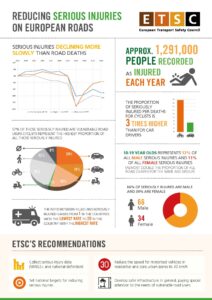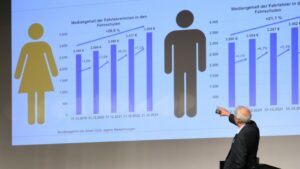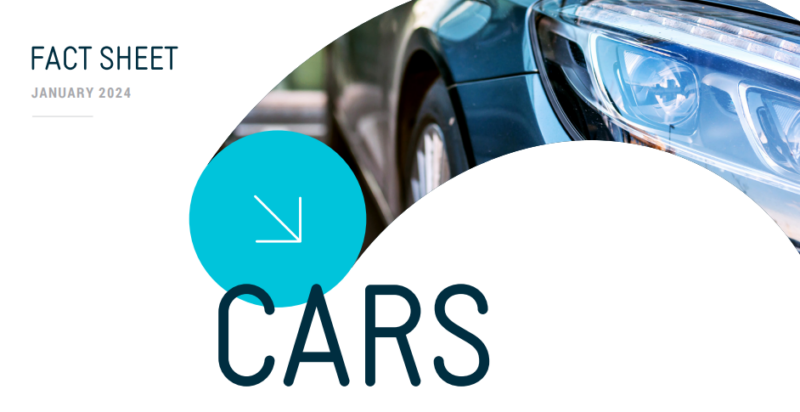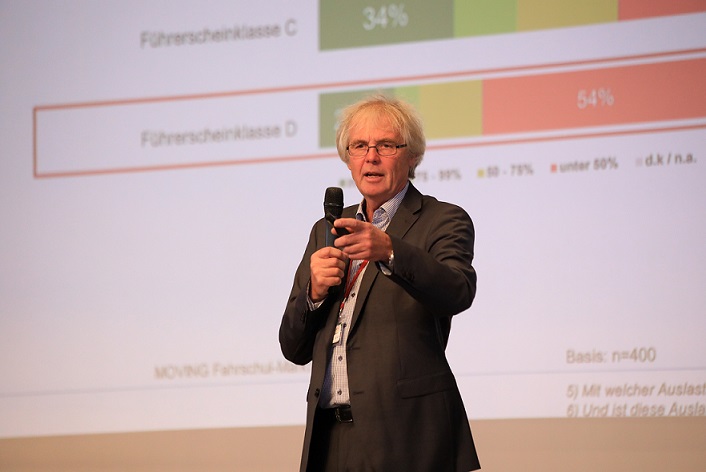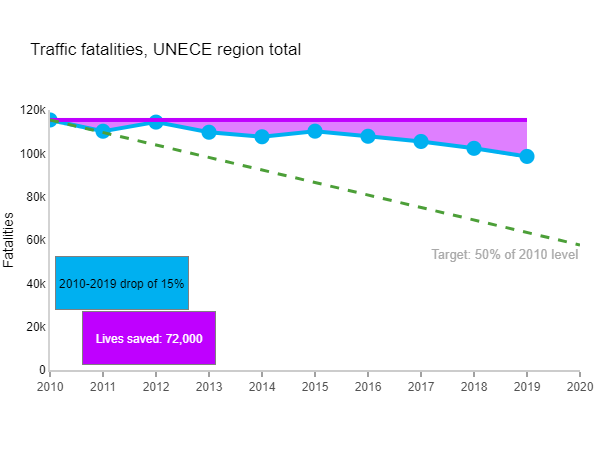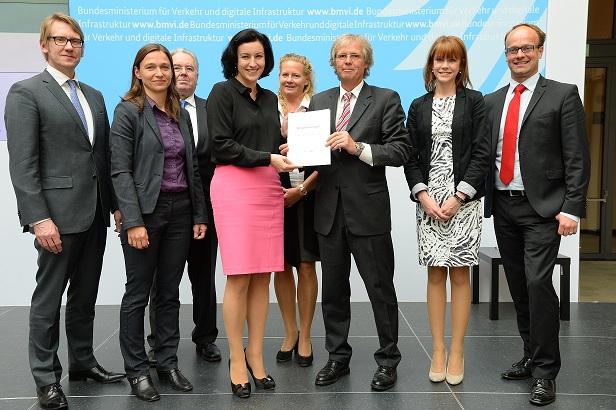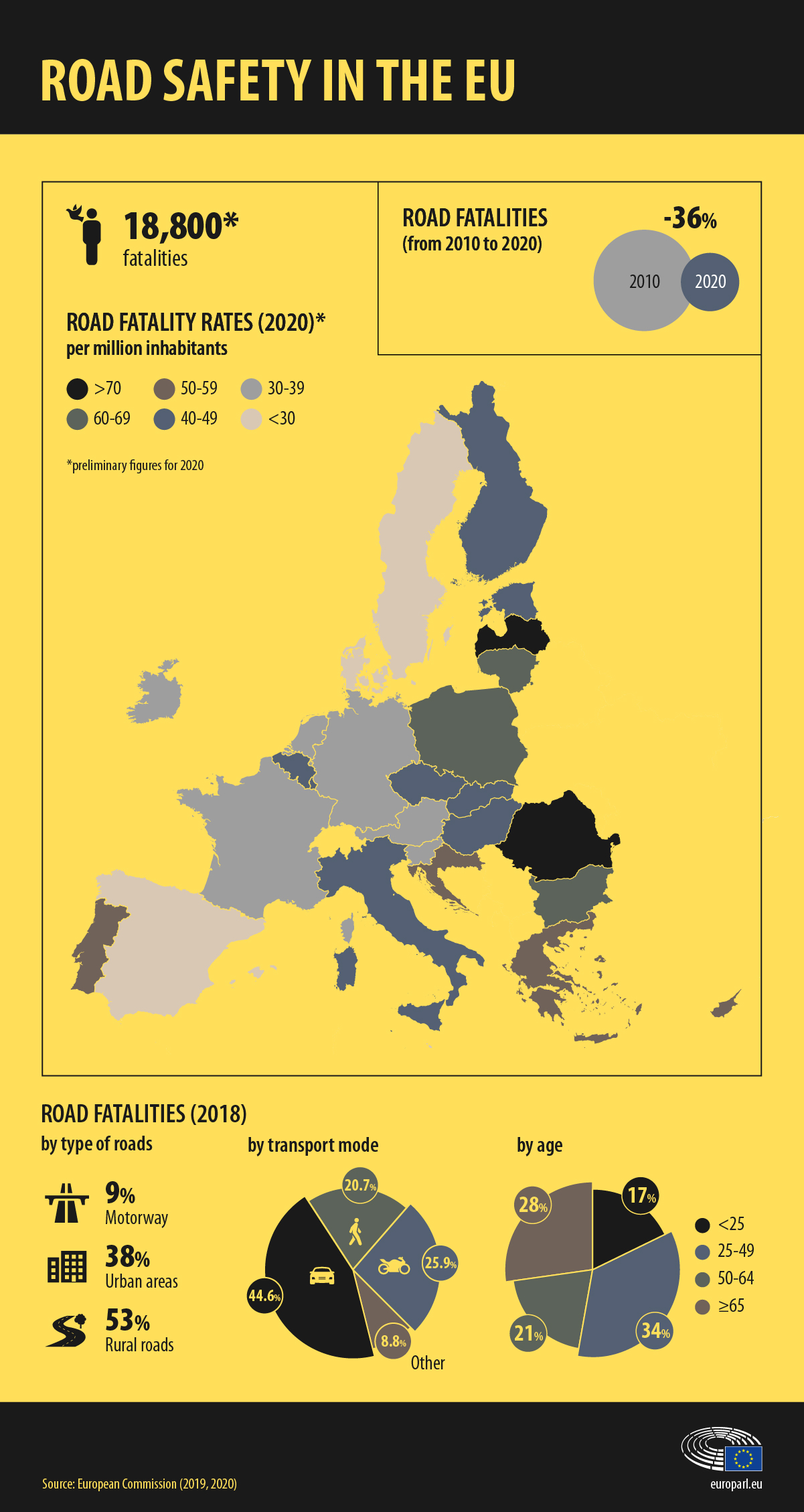MOVING News:
1st July 2025: Young and Old
Despite worries over older drivers, it is the young that remain the most pressing and biggest issue to road safety. Young drivers in the UK are involved in an alarming number of road crashes. It is the conclusion of a Parliamentary report published and debate earlier in the year.
Following this, new data from GoShorty backs up the statistical evidence that this is a national problem. More details you can find here: Young and Old – Intelligent Instructor – Intelligent Instructor
3rd June 2025: Current status of the EU driving licence directive
On May 14, 2025, the European Parliament’s Transport Committee (TRAN) approved a provisional agreement on the reform of the EU Driving Licences Directive, with 36 votes in favour and 6 against. This agreement marks a significant step toward modernising European driving licence law. Its key objectives are to improve road safety across Europe, make the driving profession more attractive, and advance the digital transformation of the transport sector.
The agreement must now be approved by the EU Council before it can be adopted by the full Parliament. The provisional date for the plenary session (2nd reading) is set for autumn 2025. Our summary you can find here.
28th May 2025: Presentation of the the Road Worthiness Package by the European Commission
The Director of directorate C (land transport), Mr Kristian Schmidt presented the Roadworthiness package the European Commission published on 24 April 2025. The package comprises two directives that amend or replace several directives of the 2014 roadworthiness package. The first directive focuses on vehicle registration requirements while the second covers roadworthiness tests and technical roadside inspections. More information: Presentation of the the Road Worthiness Package by the European Commission | Highlights | Home | TRAN | Committees | European Parliament
20th May 2025: Transport MEPs back deal on EU driving licence rules
A provisional deal on EU driving licence rules introducing a mobile licence and driving disqualification for reckless drivers was approved in TRAN Committee on Wednesday. A revamped EU driving licence rules, agreed by Council and Parliament negotiators, led by EP rapporteur Jutta Paulus (Greens, DE), in March 2025, seek to contribute to road safety and EU’s digital transition.
EU rules will set a probationary period of at least two years for new drivers, who will be subject to stricter rules and sanctions for driving under the influence of alcohol and driving while not using safety belts or child-restraint systems. MEPs secured an encouragement for EU countries to pursue a zero tolerance policy on alcohol and drugs that would ban consumption for all drivers.
Before they are issued with first licence, all drivers should pass a medical check, including of their eyesight and cardiovascular condition. However, for car drivers or motorcycle riders EU countries may opt to substitute the medical check by self-assessment forms or, in case of driving licence renewal, other alternative measures.
To mitigate a shortage of professional drivers, the minimum age whereby a driver can obtain a truck licence will be lowered from 21 to 18, and for a bus driving licence from 24 to 21, provided the applicant holds a certificate of professional competence, the agreement says.
The provisional agreement on EU driving licence rules was approved by Transport and Tourism Committee by 36 votes to six. It now needs to be approved by the EU Council, before it could be voted by the full House.
More information you find below: Transport MEPs back deal on EU driving licence rules | News | European Parliament
17th April 2025: More safe and secure parking for professional drivers is needed, EU study reveals.
According to a new European Commission study the EU is facing a critical shortage of Safe and Secure Parking Areas (SSPAs) for professional drivers, with a current gap of 390,057 parking spaces that is expected to grow to 483,000 by 2040.
More information: More safe and secure parking for professional drivers is needed, EU study reveals – European Commission
15th April 2025: IRU report: Widening age chasm compounds truck driver shortage crisis
The International Road Transport Union (IRU) has released a report indicating that 3.6 million truck driver positions remain unfilled across 36 countries, a figure unchanged from 2023 due to reduced transport demand. However, the report underscores a growing age disparity within the profession.
Key Findings:
- Decline in Young Drivers: The proportion of drivers under 25 has decreased by 5.8%, now constituting only 6.5% of the workforce. In countries like Germany and Italy, this figure drops to 2.6% and 2.2%, respectively.
- Increase in Older Drivers: Drivers over 55 now make up 31.6% of the workforce, with countries such as Spain, Australia, and Italy reporting figures between 45% and 50%.
- Impending Retirements: An estimated 3.4 million drivers are expected to retire by 2029 in the surveyed countries, potentially exacerbating the shortage.
More information you can find below: Widening age chasm compounds truck driver shortage crisis: new IRU report | IRU | World Road Transport Organisation
31st March 2025: ETSC- Reducing Serious Injuries on European Roads
This report provides an in-depth assessment of serious road traffic injuries across Europe and presents key recommendations to enhance road safety for both national governments and the EU. The Road Safety Performance Index (PIN) programme, which underpins this report, serves as a vital policy tool to assist national governments and the European Union in their efforts to improve road safety across 32 participating countries, including the 27 Member States of the EU, as well as Israel, Norway, the Republic of Serbia, Switzerland, and the United Kingdom. The report highlights that serious injuries are a critical, yet often underestimated, aspect of road safety. While road deaths rightly receive significant attention, the long-term consequences of serious injuries, including pain, disablement, and the associated societal costs, demand greater consideration. Approximately 1,291,000 people are reported injured annually in the European Union, 141,000 of these injuries are serious. However, this figure likely underestimates the true extent of the problem due to inconsistencies in data collection and sometimes massive underreporting.
27th March 2025: ETSC press release: The danger of ‘cars for kids’ in new driving licence rules
Ellen Townsend, Policy Director of the European Transport Safety Council commented:
“This is an incredibly irresponsible decision that could see children as young as 15 driving SUVs around towns and cities across the EU in a few years. It is sad and ironic that the pressure for this children’s driving licence has come from Sweden – a leader on road safety – but a country that has nevertheless allowed teenagers to drive converted cars known as A-traktors at up to 30 km/h for many years.
“These EU changes have the potential to open up driving to millions more fifteen-year-old children, driving ordinary cars and SUVs that require no conversion other than a speed limiter, at up to 45 km/h. The European Commission’s own impact assessment warned that this would be dangerous for other road users such as pedestrians and cyclists. In a few years we could see child pedestrians and cyclists seriously injured and killed on our roads by other children driving cars – an appalling thought.”
More information: The danger of ‘cars for kids’ in new driving licence rules – ETSC
26th March 2025: Road Safety: Agreement on the Reform of EU Driving Licence Rules
Negotiators from the European Parliament and the Council have reached an agreement in Brussels on new driving licence rules. A digital driving licence will be introduced, along with a mandatory probationary period for novice drivers and the extension of accompanied driving to include trucks. The agreement, reached early Tuesday morning in Brussels, will update the EU Driving Licence Directive. The aim is to improve road safety across Europe — nearly 20,000 people die on EU roads every year.
Key points:
– Training on mobile phone use and driving under hazardous conditions
– Digital driving licence
– Two-year probationary period for novice drivers, stricter alcohol limits
– Lower minimum age for professional drivers and introduction of accompanying drivers
– Validity periods and health checks
– Mandatory medical checks when a driving licence is first issued
Next steps
The provisional agreement still needs to be formally approved by both the Council and the Parliament. Once adopted by both EU institutions, the directive will enter into force 20 days after its publication in the EU Official Journal. EU member states will then have four years — with the exception of the digital driving licence — to transpose the new rules into national law and prepare for implementation.
You can read the full press release here: Road safety: deal for modern EU driving licence rules | News | European Parliament
04th March 2025: Update/Summary: Negotiations on EU driving license rules
On February 18, Mr. Tegethoff reported on behalf of MEP Paulus (Greens, DE) to the European Parliament’s Transport Committee on the progress of the trilogue negotiations on the EU Driving License Directive. The next meeting is scheduled for March 24.
- Technical agreements concern accompanied driving with uniform standards, improving driving instructor training and stricter examination requirements.
- The “Dutch Reach” method is intended to increase the safety of cyclists, and bus drivers will in future bear more responsibility for vulnerable passengers.
- Digital driving licenses are to be introduced by 2030 and will coexist with physical licenses. The EU Parliament insists that the physical license be retained, especially for travel outside the EU.
Open political issues include a zero-alcohol limit for new drivers, flexible probationary periods and adjustments to the minimum age to address the shortage of truck and bus drivers. The residence regulation for driving license tests is also being discussed – the Parliament supports tests in both the country of residence and the country of origin, with the exception of professional driver licenses.
Further talks revolve around weight limits for electric and hydrogen vehicles, as well as the cross-border mobility of emergency vehicles. In addition, the Parliament is advocating for driving simulators and digital learning platforms to combat the shortage of driving instructors, as well as for financial support for driving schools.
Negotiations on mutual recognition of driving licences in the EU and faster recognition of foreign professional driving licences are ongoing. The next trilogue meeting will decide which measures will be included in the final directive.
You can find this speech as a video file via the link: Committee on Transport and Tourism Ordinary meeting – Multimedia Centre
19th February 2025: European Commission and IRU: STEER2E
On the 4th of February, MOVING participated in Brussels in the IRU workshop dedicated to presenting the STEER2EU study, which supports efforts to tackle Europe’s growing driver shortage. This STEER2EU workshop brought together EU policymakers, Member State representatives, and industry experts to explore ways to address Europe’s driver shortage, focusing on solutions for integrating third-country drivers into the EU transport sector.
06th February 2025: EU mobilises €422 million to support the deployment of alternative fuels infrastructure in road, maritime and air transport
Today, the Commission has selected 39 innovative projects across the EU, dedicated to deploying alternative fuels infrastructure. A total investment of €422 million, provided through the Alternative Fuels Infrastructure Facility (AFIF), will support these initiatives in driving the transition to cleaner transport. The selected projects will focus on installing public electric recharging stations, including high-power megawatt chargers for both heavy-duty and light-duty vehicles, developing hydrogen refueling stations and onshore power installations in ports as well as electrifying airports and providing infrastructure for alternative fuels such as ammonia and methanol for shipping.
13th December 2024: BASt report Role of Driving Simulators in Driving Schools
In October 2024, BAST (Federal Highway Research Institute) published a report on the possible uses of driving simulators in the training of learner drivers. MOVING President Jörg-Michael Satz also contributed to the creation of the paper.
Driving schools are faced with a wide range of factors from various social, economic, political and technological areas with high complexity. The use of driving simulators in driver training could offer great potential for overcoming the situation and aligning driving schools to future challenges.
In summary, the analyses in this study cover the entire driver training process – from theory lessons and practical driver training through to obtaining a driver’s license. Along these parallel process chains, the concrete application possibilities of driving simulators have now been documented in detail. Additionally, integrated driving simulator concepts enable learning environments to promote individual learning processes. Against this background, the main recommendations for the systematic integration of simulators into driver training relate to the integration of systematic learning status checks and diagnostics to check the learning status of their students, and the enrichment and optimization of training units for novice driver training with digital elements , the initiation of a certification process for the technical and software specification of driving simulators that meet the requirements of high-quality driving school training, the advancement of training quality in driving schools through systematic quality management on suitable procedural, organizational and content dimensions as well as for the technical advancement of Driving simulators.
12th December 2024: Symposium on Autonomous Driving
On November 25, 2024, the “Symposium on Autonomous Driving” took place at the Munich Urban Colab. The symposium, organized by the Digital Hub Mobility, brought together experts from technology companies, transport companies, cities, science and government to discuss solutions and next steps for the implementation of autonomous driving in Europe.
Autonomous driving has the potential to fundamentally change mobility, especially as a supplement to public transport. Demand-responsive autonomous vehicles can reduce operating costs, solve the driver shortage and make traffic safer. It helps improve the quality of life in cities and promotes rural mobility. However, while the US and China are making great strides, Europe is lagging behind. More information can be found here: Symposium on Autonomous Driving –… | UnternehmerTUM Digital Hub Mobility
14th November 2024: Symposium Driving School & Professional Driver 2024
Two years ago, I already had the opportunity to provide insights at the symposium. This time, as President of the MOVING International Road Safety Association, I was again able to present current figures and a comprehensive report on the shortage of driving instructors. It was a great pleasure for me to inform the participants about the latest developments in this important area.
08th November 2024: The Urban Road Safety Index
In partnership with the independent research agency Multiscope, Cyclomedia has examined safety perceptions among residents of major European cities. This research underpins the Urban Road Safety Index for 2024, addressing key questions such as: Are city authorities doing enough to enhance road safety? Would a total ban on alcohol in traffic be beneficial? More information you can find here.
29th July 2024: Consumer Monitor & Survey Accessing the EAFO Consumer Monitor and Survey 2023
The completed reports offer comprehensive insights and can be an invaluable tool for anyone interested in understanding consumer behaviour and trends in the European electric vehicle market. EAFO encourage everyone – policymakers, industry stakeholders, researchers, and the general public – to make use of this information to help shape a sustainable and carbon-neutral future. Your insights and participation are critical to the successful development of electric mobility in the EU, and EAFO appreciate your continued interest and support in this initiative.
The recording of the publishing event is available on YouTube: https://youtu.be/JuIQiWOkuXw
Download the 12 country reports and 1 EU aggregated reports.
24th June 2024: CIECA workshop: Development of ADAS guidelines for driver education: On 4 June CIECA celebrated the workshop of its Educational Topical Group (ETG) about ADAS. Mr. Satz, President of MOVING is a Member of this Group. The European Union’s General Safety Regulation (GSR) establishes baseline safety requirements for motor vehicles and their trailers. This regulation, which applies to new types of vehicles from July 2022 and all new vehicles from July 2024, is a key component of the EU’s strategy to reduce the number of serious and fatal injuries in road accidents by half between 2020 and 2030.
The GSR mandates a variety of Advanced Driver Assistance Systems (ADAS) to enhance road safety. These include, for example, Intelligent Speed Assistance (ISA), Blind Spot Monitoring, Reversing Detection, Emergency Stop Signal, Drowsiness and Distraction Monitor, Automatic Emergency Braking system (AEB), Lane Keeping Assist (LKA), Alcohol Interlock system, and Event Data Recorder (commonly known as a black box).
Participants had the occasion to discuss how these systems can be included in meaningful educational modules that should enable learners to understand how to use ADAS effectively, be aware of their limitations, and most importantly, help new drivers cultivate a deeper understanding of safe driving habits and risk factors, thereby enhancing their safety awareness.
The focus of the workshop was on practical issues that have a direct impact on the work of driver teachers, and that can contribute to the creation of safer and more knowledgeable drivers. One of the objectives of the workshop was the development of basic guidelines for the education of certain ADAS by sharing best practices. Issues discussed included how these ADAS work, what complications they may entail, and how best to train on their use, while having in mind that it is crucial to remember that while ADAS can support drivers, they cannot replace the need for good driving skills and attentiveness on the road.
Mr. René Claesen talked about Automation, and Prof. David Crundall presented data about drivers‘ training needs in relation to ADAS. From the European Association of Car Manufacturers (ACEA), Pierre-Olivier Millette, Chief Technology Officer at this organization delivered a presentation, and participated, together with the rest of presenters, in a round table to exchange ideas on the topic. The Expert Advisory Group (EAG) delivered a presentation on the testing of ADAS in the practical test. Members had the possibility to exchange views on the matter within group discussions, so guidelines for ADAS training could be drafted.
13th May 2024: Driving behaviour in depression based on subjective evaluation and data from a driving simulator:
A paper titled “Driving behaviour in depression based on subjective evaluation and data from a driving simulator” authored by Vagioula Tsoutsi, Maria Papadakaki, George Yannis, Dimosthenis Pavlou, Maria Basta, Joannes Chliaoutakis and Dimitris Dikeos, has been published in International Journal of Environmental Research and Public Health. The group of patients with depression did not differ from controls regarding driving behaviour as assessed through questionnaires; on the driving simulator, patients kept a longer safety distance. Results indicated that subjective fatigue was positively associated with aggression, dislike of driving, hazard monitoring and violations as assessed by questionnaires. It was revealed that, although certain symptoms of depression (insomnia, fatigue and somnolence) may affect driving performance, patients compensate by driving more carefully, eliminating thus, their impact.
25th April 2024: CIECA WEBINAR SERIES – Driver trainer for shifting manual transmissions . Study conducted by MOVING
Student drivers in Germany can now also be issued with an unrestricted driving license if they pass the practical driving test in a vehicle with automatic transmission, which entitles them to drive vehicles with a manual gearbox. The condition for this is additional practical training on a manual transmission vehicle with at least ten driving hours. Additionally, driving instructors must ensure the safe, responsible and environmentally conscious handling of manual transmission vehicles. More information you can find here.
28th March 2024: Reducing Road Deaths on Rural Roads (PIN Flash 46)
In 2022, some 10,000 people died on the rural roads of Europe – more than half of all road deaths. Rural roads can be dangerous, compared to other road types. They often lack central and side barriers, and allow for large speed and weight differentials between the vehicles that use them, from lorries to vulnerable cyclists and pedestrians. Single-vehicle crashes, where a fatigued driver misjudges a turn and runs off the road, are common. Head-on collisions frequently occur, and are often lethal.
Press release: 10,000 killed on rural roads in the EU in 2022 (mailchi.mp)
Report: Reducing Road Deaths on Rural Roads (PIN Flash 46) – ETSC
13th March 2024: Press room: European Parliament gives more rest options for tour bus drivers
On 13.03.2024, MEPs updated EU rules on driving and resting times for drivers, to serve the specific needs of occasional transport sector. The updated EU rules on driving and resting times for bus and coach drivers involved in occasional transport services were backed by 482 votes to 120 and 20 abstentions. It ensures more flexibility in taking breaks and rest periods, as in comparison to regular bus service the occasional transport sector is subject to high seasonality, longer distances driven at the beginning and the end of the tour, as well as more frequent needs to accommodate unplanned passenger requests for additional stops or changes of routes.
The law now also has to be formally adopted by Council, before being published in the EU Official Journal and entering into force 20 days later. Here you can find more information.
28th February 2024: ETSC- European Parliament vote on teenage lorry drivers is a wrong-turn for road safety
ETSC is most concerned about the proposal to require all EU Member States to introduce an accompanied driving scheme for 17-year-old lorry drivers. The current recommended minimum age for this category of vehicle in the EU is 21, though several countries allow 18-year-olds to drive HGVs under certain conditions. Research by the German Insurance Association (GDV) shows that HGV drivers aged 18-20 caused a much higher proportion of collisions resulting in personal injury than older HGV driver age groups. Press release you can find here.
27th February 2024: MEPs threaten road safety with increase of longer and heavier lorries
The European Parliament’s Transport Committee has voted to support the expansion in the number of extra-long and extra-heavy lorries on EU roads, with serious potential consequences for road safety. The committee voted on 14 February on a proposal published in July last year by the European Commission to update EU rules on weights and dimensions of lorries. The updated new rules will have two main effects: allowing electric lorries to be heavier to allow for their batteries and simplifying the legal framework for longer and heavier vehicles, which are currently allowed only under certain conditions as part of trials.
Link: MEPs threaten road safety with increase of longer and heavier lorries – ETSC
24th January 2024: We take a look at some fascinating insights into the world of mobility in Europe. Facts that illustrate how cars are transforming society through independence and freedom of mobility. Did you know, for example, that the average European travels over 12,000 kilometres per year by car? More information you can find below: Fact sheet: cars – ACEA – European Automobile Manufacturers’ Association
8th December 2023: Update of EU driving licence rules to improve road safety
The Transport Committee backed new EU driving license rules to improve road safety and embrace the digital transition, including updated validity limits and mandatory health checks. On Thursday, 8 December, MEPs on the Transport and Tourism Committee adopted their position on the revision of EU driving licence rules by 22 votes in favour, 21 against and two abstentions.
MOVING was in Brussels holding meetings with DG MOVE and Permanent Representation of Germany to the European Union.
More information you can find here.
27th November 2023: Watch the video from Adina Vâlean Commissioner for Transport about the importance of the European Road Safety Charter.
25th October 2023: Excellence in Road Safety Awards 2023: An annual Excellence in Road Safety Awards took place in Brussels and online on Thursday 19 October 2023. This year, there were five award categories:
- Fitness to drive
- Reduced mobility
- Data
- E-commerce
- Urban road safety
The winning initiatives are examples of where organisations have delivered specific and measurable road safety actions to benefit their communities. Introducing the 2023 winners:
- Zavarovalnica Triglav and AMZS (Slovenia) – Refreshing rides for seniors with instructor
- VZW Symfoon (Belgium) – for their obstacle-free pavements with Team Trottoir
- Austrian Institute of Technology (AIT) (Austria) – for their Mobility Observation Box (MOB)
- An Post (Ireland) – for their Driving towards Zero campaign
- Municipality of Gdańsk (Poland) – for their traffic calming activities and campaigns
Adina Vălean, European Commissioner for Transport “The Excellence in Road Safety Awards is an opportunity to reward the best practices, to reward the hard work that all of you have been doing on a daily basis and to raise awareness of this effective project in Europe and beyond.”

26th September 2023: Key MEP wants safety improvements for driving licences: Karima Delli, the MEP in charge of drafting the European Parliament’s response to a European Commission proposal to revise rules on driving licences has called for a number of changes that could boost road safety. One notable innovation in Ms Delli’s draft report is a proposal for a new B+ licence for cars weighing more than 1.8 tonnes. New drivers would only be able to apply for the licence to drive the largest and heaviest vehicles, such as the BMW X5 when they are above 21 years of age, and after two years of driving.
19th July 2023: MOVING’s Survey results on cannabis in road traffic in Germany and its impact on the European legislation
In Germany the governing parties have agreed in the coalition agreement to legalize the controlled distribution of cannabis to adults. A Survey about cannabis in road traffic conducted by MOVING among driving instructors shows that: it seems that driving schools would be in favor of revising but not increasing the limit for cannabis of the THC in blood serum. Also, driving schools consider that current limit seems not to support the achievements of vision Zero goals. These are important outcomes that should be also taken into consideration in the New Proposals of the European Commission about Driving Licences (COM (2023) 0127) and driving disqualification (COM (2023) 0128). Zero tolerance rules on drinking driving should be also extended to the use of cannabis and drugs. This zero tolerance will contribute to improve road safety which is a prime objective of the Union Transport Policy and reaching the aim of reducing fatalities, injuries and material damage. It would be also necessary to prevent impunity among road traffic offenders and establish a new system allowing an EU wide cannabis consumption disqualification when a Member State decides to disqualify a driver because of the offence committed on its territory. You can find enclosed the results of the Survey.
28th June 2023: Poland wins international road safety award as deaths fall by half in ten years
The European Transport Safety Council (ETSC) has awarded its 2023 Road Safety Performance Index (PIN) Award to Poland for the first time. The country cut road deaths by 47% between 2012 and 2022, a rate only bettered by Lithuania, last year’s winner. The EU average reduction was 22%. Road mortality (the number of road deaths per inhabitant) stood at 50 per million in Poland last year, down from 93 per million in 2012. Mortality in 2022 was better than Italy (54 per million). Norway had the safest roads in Europe (21 per million) followed by Sweden (22 per million).
The announcement coincides with new analysis published by ETSC which shows road deaths in the EU rose by 4% last year, to 20,679. That number is still 9% lower than in 2019, the last year before the Covid-19 pandemic dramatically altered traffic volumes. However, ETSC is warning that a 17.2% decrease would have been needed since 2019 in order to stay on track to reach the EU and UN target of halving the number of road deaths by 2030.
The ETSC panel of experts cited several key elements in the decision to award this year’s prize to Poland in addition to the substantial reduction in road deaths:
- Poland’s comprehensive National Road Safety Programme 2021-2030 which sets targets to cut both deaths and serious injuries by 50%;
- A large-scale four-year Safe Road Infrastructure Programme;
- Expansion of the speed camera and time-over-distance camera network;
- An increase in drink-driving enforcement checks of 19% on average each year between 2010 and 2019;
- Introduction of the “emergency corridor” system of enabling emergency vehicles to access collision sites on motorways.
ETSC says speed limits and observed vehicle speeds in Poland are still too high. The 140 km/h maximum speed on motorways is the highest in the EU with the exception of Germany. ETSC has welcomed the decision to axe higher night-time speed limits in urban areas, which was replaced with a permanent 50 km/h limit in 2021. However, ETSC says Poland should also consider limiting speeds to 30 km/h on roads used by pedestrians and cyclists in urban areas.
4th May 2023: European Parliament – Dialogue between MEPs of the TRAN Committee and the European Commissioner for Transport, Ms. Adina Vălean, on current and future proposals in the field of transport
This Tuesday, April 25, 2023, the European Deputies who are members of the TRAN Committee had the opportunity to discuss with the European Commissioner for Transport, Ms Adina Vălean, about recent and future proposals in the field of transport. The Commissioner explained that the package on road safety was presented in March in addition to a proposal for a Directive on driving licenses to allow a better balance between road safety but alsofreedom of movement. The Directive on driving licenses will aim to contribute to solve the shortages of drivers by making the profession more attractive, in particular through special schemes for young people. Finally, Ms Vălean considered that a harmonization of driving licenses for drivers from third countries will be necessary to compensate for the lack of drivers.
Regarding future regulations, the Commissioner mentioned a new directive on combined transport which will see the introduction of a new instrument to measure emissions. In addition, measures on the technical inspection of vehicles will be taken, imposing technical inspections at regular intervals for new diesel vehicles. The Commissioner concluded her remarks by expressing the wish of the European Commission to make transport more sustainable and resilient.
4th April 2023: Driving without a licence poses a major risk to road safety – in all age groups. The Moving International Road Safety Association e. V. warns. Driving without driving licences.
30th March 2023: Road Safety Package: Exchange of views with the European Commission
On 21 st March, Mad. Depré, Head of Unit of Road Safety in the European Commission was invited by the TRAN Committee of the European Parliament to present the Road Safety Package which includes the new Proposal of the Directive on driving licences. MOVING participated in this TRAN Committee Session. Ms. Depré gave a short introduction about the state of the art in road safety figures in the different Member States. Overall, there were more than 20.000 people killed last year in the European roads. Few countries, like: Lithuania, Denmark and Poland have decreased the number of fatal accidents.
Concerning the Proposal of Directive on Driving Licences, Ms. Depré highlighted that the main objectives of the Proposal are: to improve road safety and the free movement of people. Ms. Depré stressed several changes, being relevant the following modifications concerning training and testing:
- A new European scheme for novice drivers with the inclusion of the accompanied driver`s modality.
- The inclusion of hazard perception and risk factors and ADAS to be tested.
- Probation period of two years after having successfully passed the driving test with 0 tolerance for alcohol.
- Inspiration of Green Deal in the new shift to automatic transmission.
- More permitted mass for category B ( increased to 4,25T) taking into account batteries’ weight.
- The age for professional drivers has not been lowered. However, they will have a quicker access at 17 years old.
- The European Commission wants to contribute to drivers shortage analyzing best practices for professional drivers in some countries as it is the case of Netherlands where the authorities are implementing very effective measures to attract young drivers to the profession.
3rd March 2023: Road safety: Commission proposes updated requirements for driving licences and better cross-border enforcement of road traffic rules.
The new rules will improve safety for all road users, and will help the EU achieve its Vision Zero – having no deaths on EU roads by 2050.They will prepare drivers better for zero-emission vehicles and for driving on city roads, alongside more bicycles and two-wheelers, and with many pedestrians around. They will also allow young drivers to gain experience through an accompanied driving scheme – from the age of 17, young people will be able to learn to drive and obtain a licence. Those who pass at 17 will be able to drive alone from their 18th birthday, and to work as a professional driver as soon as a specific job allows. This will help address the current driver shortage. More information.
4th February 2023: Another article “No false promises” worth reading about simulators and the mistakes that Fahrschule magazine published in the January print edition. Thank you for the permission to share it.
Simulators and the offer to take practice lessons on a simulator are now a permanent feature in the driving school world. However, those who want to advertise the advantages of the digital helpers must be careful to avoid some serious mistakes. More information you can find here.
2nd February 2023: An article from the magazine Fahrschule “Training in the sanctuary”: As digital aids, driving simulators can support the work of driving instructors and facilitate the first steps in learning to drive. What new products are there from the manufacturers? An overview.
20th January 2023: MOVING organized, the workshop about “The use of simulators in driver training” in collaboration with CIECA, the International Organization for Driver Testing. The workshop took place on the 24th of November 2022 in the headquarters of Springer Fachmedien München GmbH in Munich. Summary you can find here.
4th January 2023: We take this opportunity to inform you that the codified version of CPC Directive 2003/59/EC has been published in the Official Journal of the EU: It is Directive (EU) 2022/2561, which will enter into force on 12 January 2023 (replacing Directive 2003/59/EC).
It is important to highlight that in order to enhance the contribution of the Directive to road safety and the relevance of training for drivers, subjects relating to road safety should be dealt with in the training courses, such as hazard perception, the protection of vulnerable road users, in particular pedestrians, cyclists and persons with limited mobility, fuel-efficient driving, driving in extreme weather conditions and carrying abnormal loads.
The courses should also relate to intelligent transport systems and should evolve in order to keep pace with technological developments. Member States should be provided with a clear option to improve and modernise training practices with the use of information and communication technology (ICT) tools, such as e-learning and blended learning, for part of the training, while ensuring the quality of the training.
To ensure consistency between the different forms of training required under Union law, Member States should have the possibility of combining different types of relevant training: for example, it should be possible for them to combine training on the transport of dangerous goods, on disability awareness or on animal transport, with the training provided for in the Directive.
7th December 2022: ETSC: Reducing the minimum age for driving an HGV, Bus or Coach in the EU would increase safety risks
The European Commission is currently preparing a revision of the EU Driving Licence Directive 2006/126. A stated objective of the legislation is to enhance road safety: contributing to ‘Vision Zero’ and the targets of reducing road deaths and serious injuries by 50% by 2030. Despite the road safety aim of the legislation, the road transport industry has embarked on a lobbying campaign to reduce the minimum age in the EU for lorry driving to 18, with training starting at 17. ETSC argues that shortages of professional coach and truck drivers should be managed by increasing attractiveness of the sector, by improving working conditions and wages to retain current workers and attract new transport workers, not by reducing the minimum age requirements, which would increase risks to all road users. More information you can find below: Briefing – Reducing the minimum age for driving an HGV, Bus or Coach in the EU would increase safety risks – ETSC
21st October 2022: European Excellence in Road Safety award winners
A German collision hotspot map system and a Slovenian grassroots campaign to raise awareness of safety lanes on motorways were among the winners of this year’s Excellence in Road Safety Awards. The awards recognise the contributions of the European Road Safety Charter’s community of members towards the common goal of improved road safety across Europe. The four winning initiatives are examples of where organisations have delivered specific and measurable road safety actions to the benefit of their communities. The winners in the four categories – young people, technology, component of a safe system approach and professional drivers were:
- Preventiedienst stad Leuven (Belgium) for its VRKeer virtual reality initiative targeting young people.
- Initiative für sichere Straßen GmbH (Germany) for its EDDA+ Hazard Score Map project using multiple data sources to implement change and create safer roads.
- Zavod Reševalni pas (Slovenia) for its rescue belt campaign to raise awareness and change driver behaviour.
- Acciona Energía (Spain) for their Drive Safe Programme for their employees across multiple locations.
Initiative für sichere Straßen GmbH (Germany) was chosen by the audience at the awards ceremony this evening (17 October) to also receive the Jacques Barrot award. This special public choice prize has been awarded every year since 2016 to one of the winners and is dedicated to Jacques Barrot, a former European Commissioner for Transport.
13th October 2022: Symposium for driving school and professional drivers in Dortmund.
VerkehrsRundschau editor-in-chief Gerhard Grünig has organized the symposium “Driving School & Professional Driver – Challenges. Solutions. Future.” in Dortmund on 12.10.2022 opened. Around 290 guests came to Dortmund to find out about the innovations offered by the profession. MOVING is also there!
1st October 2022: MOVING surveys among driving schools and learner drivers on the topic of online theory instruction in driving schools, among other things. More information can be found in the EFA Newsletter of September 2022.
29th September 2022: Driver Shortage Report 2022
In Europe, driver shortage is steadily increasing, but is still expected to remain far from pre-pandemic levels in 2022. The driver shortage increased from 5% to 7% in 2021, and is expected to reach 8% in 2022 . This is the result of the increased demand expected for 2022 as mobility restrictions ease, and the decrease of existing drivers due to:
• Bus and coach drivers changing profession as the activity lost in the pandemic will not return
• Less young drivers being trained and accessing the profession, because of low activity, restrictions limiting training capacity, and the already low attractiveness of the profession
• Retiring old drivers who are not completely replaced with new entrants
There was a 7% unemployment rate in Europe in 2020, representing more than 15 million people, and 7 million in the scope of countries studied. This available workforce could largely cover the existing driver gap.
19th August 2022: The original Sustainable Development Goal target 3.6 aimed to halve road fatalities in the decade to 2020, but this was not met by any region (and very few countries). With the new Decade of Action on Road Safety (2021-2030) enshrining the resolve of the international community to halve road deaths by 2030, where do countries in the UNECE region stand? UNECE collects detailed road safety statistics for all its 56 member States, which can directly measure progress towards this target. Here, we will explore the different trends between countries and road users, as well as UNECE trends compared to other regions and the solutions available. Let’s dive in!
17th June 2022: Driver shortages surge, expected to jump up to 40% in 2022: new IRU survey
- Tight labour markets and high post-pandemic demand continue to feed shortages
- Higher wages in 2021 have not solved the problem
- Demographic crisis brewing with widening gap between young and old drivers
15th June 2022: Lithuania awarded road safety prize after deaths fall more than 50% in a decade
Lithuania is the winner of this year’s European Transport Safety Council (ETSC) Road Safety Performance Index (PIN) Award, in recognition of major improvements in road safety over the last decade. Out of the European countries tracked by ETSC, Lithuania was the only EU country to halve road deaths between 2011 and 2021. Among non-EU European countries, only Norway did better with a reduction of 52%.
31st May 2022: Pricing instruments on transport emissions
The TRAN Committee of the European Parliament has published a study which provides a general overview of the current and proposed pricing instruments on road transport emissions in the EU.
20th May 2022: Fit for 55: MEPs back CO2 emission standards for cars and vans
-
Support for the 2035 zero-emission road mobility objective
-
Call for a methodology for assessing the full life-cycle of CO2 emissions
-
Mitigate negative economic impact of the transition with targeted funding
Environment Committee MEPs are in favour of a pathway towards zero-emission road mobility in 2035 for new passenger cars and light commercial vehicles. The Committee on the Environment, Public Health and Food Safety (ENVI) adopted on Wednesday, with 46 votes in favour, 40 against and two abstentions, its position on proposed rules to revise the CO2 emission performance standards for new cars and vans in line with the EU’s increased climate ambition. In the report, MEPs expressed their support for the Commission proposal to reach zero-emission road mobility by 2035.
4th May 2022: Entries for European Road Safety Charter 2022 awards are now OPEN!
European Road Safety Charter writes: “We are thrilled to announce that our Excellence in Road Safety Awards will take place on Monday 17 October 2022 in Brussels, Belgium and online. Our annual awards are the perfect opportunity to recognise the incredible achievements of our members towards the common goal of improved road safety across Europe. The projects we showcase during our ceremony will help to share knowledge and inspire the next set of road safety initiatives, allowing us to build greater momentum towards our Vision Zero goal – reducing road deaths to almost zero by 2050. The deadline for the submissions is 6 June 2022. The Charter team and the National Relays will be able to support your submission.”
8th February 2022: Neurophysiological study „The learning brain: in-presence vs remote teaching at driving school“ by Prof. Babiloni proves: Attention decreases faster in distance learning. Prof. Fabio Babiloni is a professor of industrial neuroscience and neuromarketing at the University of Rome “Sapienza” and the scientific director of BrainSigns, a spin-off company of the University “Sapienza”. BrainSigns has also been working in the field of road safety for several years and has recently completed a study on cognitive attention, assessing the level of attention and comprehension of learner drivers during a theory lesson, comparing face-to-face and remote (online) mode. It proves that didactics are experienced differently in the classroom and in distance learning. It turned out that the subjects’ engagement was initially similar in both situations, but the attention of the participants in distance learning decreased after 20 minutes. In addition, the distance learners made more mistakes when answering questions about the topics they had learned at a distance. You can read the full interview with Prof. Babiloni here.
7th February 2022: The ITF Road Safety Annual Report 2021 examines the development of road safety in the year 2020 during the Covid-19 pandemic. It assesses how the pandemic has affected mobility patterns and impacted the number of road fatalities. The analysis draws on data on road deaths from 34 member countries of the IRTAD Group. These are complemented by the more detailed crash and mobility data gathered via a survey of 24 countries, mobility data from Apple Inc. and data from the Oxford Covid-19 Governmental Response Tracker. Detailed country profiles are available for download (PDF format) too. Road Safety Annual Report 2021: The Impact of Covid-19 | ITF (itf-oecd.org)
15th November 2021: The 8th Driving Instructors Congress took place on 11 and 12 November 2021 in Berlin. MOVING e.V. was also represented. Together with Mr Brendel and Mr Arndt (AMS Brendel GmbH), Mr Satz (MOVING International Road Safety Association e.V.) gave the participants of the driving instructors’ congress insights into how you should organise your company and keep an eye on long-term goals and developments and which figures and developments are important.
16th September 2021: As this interactive map shows, the market uptake of electrically-chargeable cars is directly correlated to a country’s national income (GDP per capita), showing that affordability remains a major barrier to consumers in the European Union.
15th August 2021: The European Automobile Manufacturers’ Association (ACEA) publishes this statistical Progress Report – now in its fourth edition – on an annual basis in order to monitor the availability of charging and refuelling infrastructure as well as the affordability of zero-emission vehicles. The aim is to track progress on these key enabling factors over time. This report an another information you will find below: 2021 Progress Report – Making the transition to zero-emission mobility – ACEA – European Automobile Manufacturers’ Association
13rd July 2021: About the death counter: The figures shown in the death countdown visualization and the associated day, month and year counters are global estimates based on the annual totals for 2016, or the last year for which data is available. WHO | Death on the roads
6th July 2021: Clean transport, Urban transport/New Urban Mobility Initiative: Five consultation workshops for stakeholders in June
In line with the priorities of the European Green Deal and the Sustainable and Smart Transport Strategy, transport – including urban mobility – should become drastically less polluting and undergo twin green and digital transitions, to build a resilient and sustainable transport system for generations to come. Additional information is available in the published roadmap. The European Commission’s new urban mobility initiative, currently under preparation, will operationalise these goals by proposing actions needed to address common urban mobility challenges like pollution, congestion, accessibility and urban road safety, thus improving people’s quality of life.
2nd June 2021: CIECA Annual Report 2020-2021 is available. The CIECA 2020 – 2021 Annual Report which provides information on all the activities that CIECA organized from September 2020 to May 2021 is available online CIECA 2020-2021 Annual Report
26th May 2021: IRU is calling on the World Health Organization and national governments to introduce urgently a global mutually recognised digital vaccination certificate for commercial truck and coach drivers. More information: IRU sends distress call to WHO and governments on COVID-19 driver vaccinations | IRU
4th May 2021: The EU Road Safety Results Conference was an opportunity to share progress on the implementation of the Safe System approach with EU Member State authorities and all stakeholders. In particular, participants could learn how work is progressing on the Key Performance Indicators set out in the policy framework Next Steps Towards Vision Zero. A forum for analysis and exchange between senior EU policy makers and the wider European road safety community was also provided. Under the link you will find the presentations: EU Road Safety – Results conference | Mobility and transport (europa.eu)
3rd May 2021: EC Consultation. Inception Impact Assessment Driving licences: The EC is launching this consultation in the context the inception Impact Assessment of the Driving Licence Directive (Directive (EU) 2006/126/EC). The results of the evaluation will be taken into consideration when preparing the impact assessment and looks at the ‘context’, ‘problem definition’ and there is also a ‘subsidiarity check’. It sets out the objectives and policy options of the revision the social, economic and other impacts. The last part looks at the evidence base. Here is the link to the consultation: https://ec.europa.eu/info/law/better-regulation/have-your-say/initiatives/12978-Revision-of-the-Directive-on-Driving-Licences
26th April 2021: On 21.04.2021 we were invited to give a presentation on the topic of driving without a licence as part of a CIECA webinar. Enjoy reading!
23th April 2021: Matthew Baldwin: “I am delighted to welcome you to the first edition of the newsletter of the new and relaunched European Road Safety Charter.() With the relaunched European Road Safety Charter, we want to build a stronger presence at national level and increase awareness among different types of organisations and entities (such as the motor industry, research institutes, the education sector and non-governmental organisations). I encourage you to act now – reach out to organisations that you think could get involved, and form alliances at home and abroad with those with shared interests. Your actions, your monitoring of progress and your voluntary commitments to boost road safety are fundamental to achieving Vision Zero in Europe.”
20th April 2021: Road safety: 4,000 fewer people lost their lives on EU roads in 2020 as death rate falls to all-time low. Today the European Commission published preliminary figures on road fatalities for 2020. An estimated 18,800 people were killed in a road crash last year, an unprecedented annual fall of 17% on 2019. This means almost 4,000 fewer people lost their lives on EU roads in 2020 compared to 2019. Lower traffic volumes, as the result of the COVID-19 pandemic, had a clear, though unmeasurable, impact on the number of road fatalities.
19th April 2021: The future is in your hands: This platform is the hub of the Conference on the Future of Europe. This is your opportunity to speak up, to say what kind of Europe you want to live in, to help shape our future.
10th March 2021: We noticed the discrepancy in the main menu when switshing languages. We are working to figure out the problem. Please stay put.
9th March 2021: Today the Commission presents a vision, targets and avenues for a successful digital transformation of Europe by 2030. This is also critical to achieve the transition towards a climate neutral, circular and resilient economy. The EU’s ambition is to be digitally sovereign in an open and interconnected world, and to pursue digital policies that empower people and businesses to seize a human centred, sustainable and more prosperous digital future. This includes addressing vulnerabilities and dependencies as well as accelerating investment.
08th March 2021: According to 2019 traffic accident data, Road Safety shows that women are less dangerous behind the wheel than men. On the occasion of the International Women’s Rights Day this March 8, 2021, the Road Safety reminds once again that women drivers are less involved in road accidents, figures to support. Read the full frensh article here.
2nd March 2021: The Journal of Safety Research has published an article “Analyzing the safety impact of longer and heavier vehicles circulatin in the European market“. The authors conclude, “The results show that countries that currently allow megatrucks to circulate have, on average, a lower number of traffic accidents and fatalities. Conclusions: Traffic of this type of vehicle is only advisable in countries where there is a certain level of maturity and proven success in the field of road safety. Practical applications: European countries that have allowed the traffic of mega trucks achieve better results in terms of road safety, although the accident fatality rate seems to be higher. Consequently, the introduction of mega-truck traffic requires prior proper preparation and testing.”
12th June 2019: MOVING raises awareness for the general problem of driving without a valid license. This issue does not only but all around the world. We want to encourage non-governmental and governmental road safety institutions to gather data on the topic and evolve ideas to tackle the problem. Read more in our recent press release and the Chart of the Month.
16th August 2018: MOVING is glad to present you to new and interesting insights in our daily work in English today. Form now on you can find two new documents in the facts & figures section on this page.
First, we did put together a little introduction of our organization and Goals in the MOVING Image Brochure.
Also, we want to put your attention on the first English version of our MOVING Driving School Report 2018, offering a detailed overview on the German driving school industry.
24th October 2016: The 5th October 2016, DEKRA-Spain with the collaboration of MOVING and the national Spanish Member ETRASA, celebrated in Madrid the presentation of the DEKRA European Road Safety Report 2016. It has been the first time that this Report has been presented in Spain. Read more.
24. October 2016: Since MOVING is very interested in new methods of teaching for young drivers and ways to integrate new technology in their education, we commissioned a study on the subject of the use of driving simulators in driving schools. The study was carried out by the Institut für Automobilwirtschaft (Institute for Automotive Industry) and presented at the CIECA Congress in Madrid in summer. Read more.
12th January 2015: Jörg-Michael Satz is new president of MOVING. Since March 2014 Jörg-Michael Satz was vice president.
Read more in the press release (only in German).

1 July 2014:
Press Release
Recommendations handed over to Ministry
Since several years now, the periodic training for all professional drivers in Europe is mandatory. Since 2006, the Professional Driver Qualification Act (Berufskraftfahrer-Qualifikations-Gesetz) regulates the mandatory training of professional drivers in Germany. Professional drivers have to provide a proof of having participated in a 35-hour periodic training every 5 years. In practice, however, there appeared significant implementation problems from the beginning. Uniform controls, content liability, tamper-proof certificates – all not existing.
Recommendations for a revision of the legislation have now been handed over to the Parliamentary State Secretary of the German Federal Ministry of Transport and Digital Infrastructure, Dorothee Bär, in the margins of the award ceremony of the young drivers’ initiative “Hallo, Zukunft” presented in Berlin. Read more (in German)
29 April 2014:
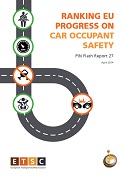 The European Transport Safety Council (ETSC) has published the latest PIN Flash Report No. 27 today. Around 240,000 car occupants were killed in road collisions in the EU in the years 2001-2012. There was a reduction of 55% from 2001 (27,700 in 2001) to 2012 (12,345 deaths in 2012). The report shows the EU member states with the highest reduction rate in killed car occupants. Finally, the report gives recommendations to member states and EU institutions how to go on with this trend. One of the key recommendations is “Improve learning and qualification systems for novice drivers” – a recommendation MOVING strongly supports, because novice drivers still remain the road user group with the highest risk of being killed or injured.
The European Transport Safety Council (ETSC) has published the latest PIN Flash Report No. 27 today. Around 240,000 car occupants were killed in road collisions in the EU in the years 2001-2012. There was a reduction of 55% from 2001 (27,700 in 2001) to 2012 (12,345 deaths in 2012). The report shows the EU member states with the highest reduction rate in killed car occupants. Finally, the report gives recommendations to member states and EU institutions how to go on with this trend. One of the key recommendations is “Improve learning and qualification systems for novice drivers” – a recommendation MOVING strongly supports, because novice drivers still remain the road user group with the highest risk of being killed or injured.
You can download the report on ETSC website:
PIN Flash Report 27 “RANKING EU PROGRESS ON CAR OCCUPANT SAFETY”


